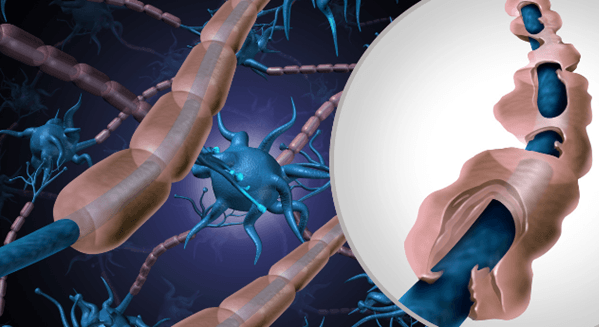Fractalkine: a breakthrough for multiple sclerosis treatment?

The chemokine fractalkine could have the potential to stop and possibly reverse the effects of MS and other neurodegenerative diseases according to a recent study demonstrating its ability to regenerate myelin in mice.
Multiple sclerosis (MS) is an autoimmune disease affecting myelin and myelin-producing cells (oligodendrocytes) in the brain and spinal cord. Loss of myelin in the central nervous system (CNS) can cause various symptoms ranging from mild, such as numbness and blurred vision, to severe, including paralysis and memory problems. Despite this debilitating disease affecting around 2.5 million people globally, the current treatment landscape is lacking and there are no approved treatments that stimulate CNS remyelination.
Remyelination has the potential to reverse MS symptoms and slow or even prevent disease progression. Consequently, CNS remyelination treatments remain an important avenue for novel research, particularly as current therapies for MS are fairly unsuccessful.
Fractalkine is a chemokine broadly expressed in neurons, with its receptor CX3CR1 predominantly restricted to microglia. Fractalkine has been shown to promote the survival and development of several cell types during inflammation and homeostasis, including oligodendrocytes, whose primary function is to maintain the myelin sheath. Given this researchers sought to explore the therapeutic potential of fractalkine in treating neurodegenerative diseases, including MS.
In a recent study published in Stem Cell Reports, Anastassia Voronova from the University of Alberta (Edmonton, Canada) injected fractalkine into mice with chemically induced MS. The results demonstrated that fractalkine generated increased production of de novo oligodendrocytes and remyelination from reactivated oligodendrocyte precursor cells in the brains of the diseased mice, a process that is normally extremely inefficient in patients suffering from MS.
These results are particularly promising. While previous research has demonstrated the neuroprotective role of fractalkine prior to the induction of demyelinating lesions, until now, there have been no reports on fractalkine’s potential to stimulate remyelination and regeneration after the disease has been introduced.
The researchers also discovered that fractalkine decreased inflammation, which is caused by autoimmune attack in MS, reducing the damage to myelin and oligodendrocytes. Safety and efficacy data were also consistent with previous research investigating the effects of fractalkine in mice.
Future research will focus on testing fractalkine in mouse models with other neurodegenerative diseases, in addition to alternative animal models. Fractalkine could become a novel contender for remyelination therapies that may potentially stall and even reverse the effects of MS. If fractalkine continues to show promise in other disease and animal models, it could become a miracle treatment that MS and other neurodegenerative diseases so desperately require.